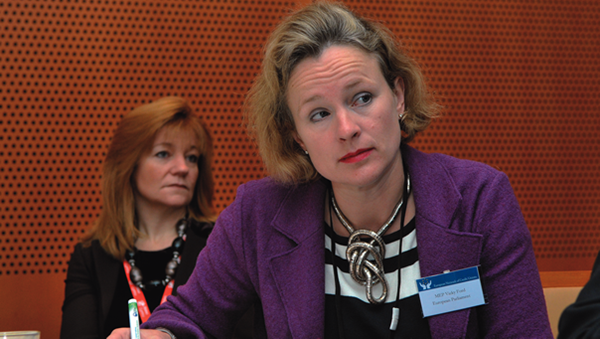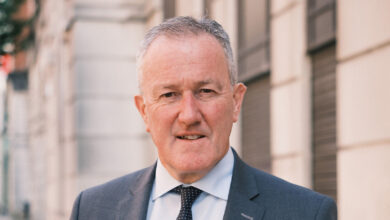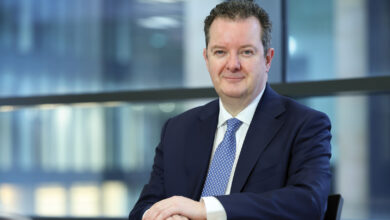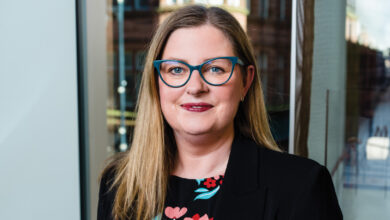Vicky Ford interview: Europe’s values
A banker turned politician, Omagh-born MEP Vicky Ford shares her recollections of Northern Ireland and explains the need to control Europe’s cost.
Diving under a school desk because of a bombing was an exception to Vicky Ford’s “extremely happy” childhood in Omagh. The Eastern England MEP now hopes the province can look forward to a brighter future and become part of the political mainstream.
Born Vicky Pollock in the County Tyrone town in 1967, both of her parents were English doctors. “My father fell in love with Northern Ireland when he was a teenager and that’s how we ended up there,” she remarks.
Ford recalls having many close friends as she grew up between Omagh and Gortin. Both of her parents were involved in cross community and environmental work. Her mum, an on-call doctor for the police, was also involved in the local peace movement and helped bring Catholics and Protestants together after the Ballygawley bus bombing.
Life changed suddenly at 10 when her dad, a popular hospital consultant, died in an accident. Hundreds of people came to the funeral.
“After his death, I went to school in England to be closer to our extended family,” she continues, “but I always returned to visit Northern Ireland.”
Studying maths and economics at Cambridge University’s Trinity College led quickly into a banking career, firstly with JP Morgan from 1989 to 2001, where she rose to be Vice-President for loan syndication, fixed income and debt capital markets. A post as Managing Director for loan capital markets followed at Bear Stearns International, up to 2003.
A restlessness with sitting behind a City desk prompted her to move into politics. She contested Birmingham Northfield in the 2005 general election, served on South Cambridgeshire District Council from 2006 to 2009 and was elected to the European Parliament in June last year. Ford is now the Conservatives’ Economic and Monetary Affairs Spokeswoman in the Parliament.
Although she left at a young age, Northern Ireland has had a lasting impact on her politics. “It definitely affected the way I think about campaigning in your community, which is what drives me,” she comments, referring back to her parents’ work.
Her interest in environmental issues is also a natural follow-on from growing up in the “beautiful surroundings” of the province but she also has a sense that it is being left out of the larger political scene.
“I would love to see a Northern Ireland that, in the future, is involved in more mainstream politics,” she adds. “There have been some great leaders from Northern Ireland in the UK and across Europe in the past, and I would love to see Northern Ireland having that role in the wider political debate.”
Ford is clearly pleased with the results of the peace process and names the “fantastic” education system as one reason for the region’s strength.
“Compared to my childhood, the stability that is enjoyed by children today is very different to what I experienced. I remember having to dive under a school desk because of a bomb and for children today, not to have to live with that noise and terror is wonderful,” she says.
“I remember seeing my first firework when I was in England aged 11 because you weren’t allowed fireworks during the Troubles. I still get emotional when I see fireworks because it reminds me of a country living in peace.”
Post-crisis
Banking has a major bearing on her work as an MEP, especially in helping to draw up financial regulation legislation after the economic crash. International agreements and markets must be designed in a way that avoids going “back into the situation where the taxpayer, whether they are a depositor or creditor, bails out the bank.”
This is part of a much wider debate than over how the banks operate. Pension funds, saving and protection for consumers are all topical, the latter point being a priority for her. Separately, Ford’s seat on the Industry, Research and Energy Committee sees her looking at energy efficiency and environment issues.
As an MEP, she has less direct contact with voters than an MP would have. Before 1999, Eastern England was divided into eight smaller constituencies using first-past-the-post. She reflects that this system would make an MEP closer to constituents but being an MEP for wealthy London commuters, rural dwellers and farmers means she is familiar with a wide range of issues which affect all people in the area.
One of Ford’s running themes during her term to date has been calling for more financial accountability in the EU. Its budget, she maintains, must stop growing as central and local government in the UK is cutting public spending. In particular, she wants the Parliament to stop meeting in its second chamber in Strasbourg.
The UK is expected to contribute £8.3 billion to the EU in 2010-2011 and received £4.7 billion in 2007-2008, the most recent year for which audited accounts are available. However, despite her criticisms of its cost, she still thinks the EU has a value. Withdrawal, in her view, would actually be more expensive.
“There is a value to the EU in that we need international legislation, not just within Europe, but with America, and the European Parliament is a useful way to do that,” Ford comments, adding that it is better to “stay and achieve reform from within.”
For some issues, EU legislation “isn’t necessary” and these should instead be dealt with at a national or local level. One example is the Working Time Directive for lorry drivers. The UK, though, needs to work with other countries on international trade and business agreements.
“If we didn’t,” she concludes, “the cost to Northern Ireland and the rest of the UK would be considerably higher.”

- Member, Economic and Monetary Affairs Committee and Special Committee on the Financial, Economic and Social Crisis
- Substitute, Industry, Research and Energy Committee
- Married to Hugo, a consultant in cancer medicine, with three children
- Plays the clarinet and is learning the saxophone
- Other interests include fishing, skiing and gardening






